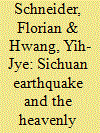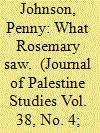| Srl | Item |
| 1 |
ID:
130614


|
|
|
|
|
| Publication |
2014.
|
| Summary/Abstract |
Throughout much of history the Institute a/'/international Relations /[IR] has been perceived as a Kuomintang think tank. Based an the perspective generated by personal contributions (before its formal establishment in 1975as part of National Chengchi University, the author tracer the IIR's foundations and key staff as far back as 1937 to argue that is was constructed during a national crisis because the state leader needed professional opinions that could be used strategically. Thus rather than considering the IIR as an organization subject to a political party. it should be regarded as on institution charged with gathering scholars to defend the country.
|
|
|
|
|
|
|
|
|
|
|
|
|
|
|
|
| 2 |
ID:
091225


|
|
|
| 3 |
ID:
122763


|
|
|
|
|
| Publication |
2013.
|
| Summary/Abstract |
Examining the experiences of the South since Sudan's independence, this article analyses why the choice of 'unity' became an unrealistic option for South Sudanese. Stressing that self-determination for the South was the only way to resolve Sudan's long-standing national crisis, this article points out, at the same time, that it left unresolved the issue of self-determination for the peoples of the northern Sudan who joined the Sudan People's Liberation Movement/Army and brought new problems, particularly to the newly created international border area between Sudan and South Sudan.
|
|
|
|
|
|
|
|
|
|
|
|
|
|
|
|
| 4 |
ID:
131640


|
|
|
|
|
| Publication |
2014.
|
| Summary/Abstract |
In the aftermath of the 2008 Sichuan earthquake, the Chinese authorities launched a major public relations campaign to relay positive images of their relief effort and strengthen their political legitimacy. The effect has been a proliferation of symbols and political statements related to the disaster, not only in the official media, but also in cultural products such as movies or mass-media events. The earthquake has become part of the discourse of suffering, struggle, solidarity and ultimately victory. This article examines the ways in which various cultural products present the Sichuan earthquake and asks what meanings national crises have in the Chinese discourse on political legitimacy. The article analyses two cases: Chinese film, here in the form of Feng Xiaogang's blockbuster Aftershock, and performance-based discourses during the Beijing Olympics, the PRC's 60-Year Anniversary and the Shanghai Expo. By conducting a discourse analysis, we show how the earthquake has become part of a recurring discursive formation that is used by state and non-state actors alike to legitimate China's developmental model. Within this discourse, the leadership of the Party, the mastery of free markets and a revamped version of the Confucian idea of benevolent rule are marshaled as the decisive factors for winning any 'battle'.
|
|
|
|
|
|
|
|
|
|
|
|
|
|
|
|
| 5 |
ID:
153239


|
|
|
|
|
| Summary/Abstract |
This article offers a critical comparison between the methods used by Britain in Northern Ireland between 1969 and 1994, and those used by Israel in the West Bank and Gaza between 1987 and 1993. It analyses the dilemmas, difficulties, and obstacles faced by governments in dealing with terrorism. The comparison indicates that despite the differences in the nature of the conflicts, the methods used by both countries were similar. It also suggests that there is equivalency in the retorting principles guiding regimes in the course of emergency situations.
|
|
|
|
|
|
|
|
|
|
|
|
|
|
|
|
| 6 |
ID:
092955


|
|
|
|
|
| Publication |
2009.
|
| Summary/Abstract |
Referencing the 'stereotypes of self' identified by Rosemary Sayigh in the life stories of Palestinian camp women in Lebanon who had lived through the Palestinian resistance, the author focuses on the narratives of two women in Ramallah's Am'ari refugee camp since the outbreak of the al-Aqsa intifada to reflect on the Palestinian present. Though the women-and their goals and struggles-could not be more different, their narratives reveal significant shifts in self-representation that reflect both the impact of post-Oslo political realities and the new (unattainable) aspirations fueled by satellite television images and Ramallah café culture. The narratives also reflect, in very different ways, the national crisis, the impotence of Palestinian political groups and institutions, and the erosion of solidarities.
|
|
|
|
|
|
|
|
|
|
|
|
|
|
|
|